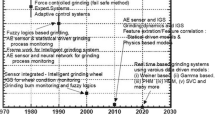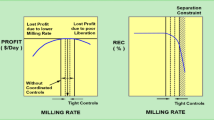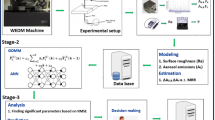Abstract
Grinding has been extensively applied to meet the urgent need for tight tolerance and high productivity in manufacturing industries. However, grinding parameter settings and process control still depend on skilled workers’ engineering experience. The process stability in complicated non-uniform wear can't be guaranteed. Moreover, it is impossible to obtain energy-saved grinding strategies. Intelligent monitoring methods are well-recognized to help conquer present trial–error processing deficiencies. However, discrete manufacturing companies have to face increasing difficulties to identify the monitored big data and make credible decisions directly. A decision-making expert system driven by monitored power data (EconG©) is thus developed. EconG© provides a 4-level database structure to efficiently manage multi-source heterogeneous data. Signal conditioning, peaks-valleys feature exaction, and compression approaches are proposed for reducing the storage volume of real-time monitored data. The data size has been reduced to 6.5% of the source. A mathematical comparison model based on the power feature is embedded to diagnose burns, which has been validated by the 16th and 55th surface grinding results. Mapping relation model from inputs, signals to outputs has been built by the power feature-extended artificial neural network algorithm. Prediction accuracy is improved by introducing adaptive control and dynamic changes in material removal. EconG© breaks a single analysis based on grinding parameters. Energy-saved grinding strategies could be intelligently acquired through the presented Pareto optimization method. In the future, a broader and deeper implementation of EconG© will guild manufacturers to respond quickly to explosive demands on intellectualization, sustainability, and flexibility in the arrived 4th industrial revolution.
















Similar content being viewed by others
References
Aghbashlo, M., Peng, W. X., Tabatabaei, M., Kalogirou, S. A., Soltanian, S., Hosseinzadeh-Bandbafha, H., Mahian, O., & Lam, S. S. (2021). Machine learning technology in biodiesel research: A review. Progress in Energy and Combustion Science, 85, 1–112. https://doi.org/10.1016/j.pecs.2021.100904
Alajmi, M. S., Alfares, F. S., & Alfares, M. S. (2019). Selection of optimal conditions in the surface grinding process using the quantum based optimisation method. Journal of Intelligent Manufacturing, 30, 1469–1481. https://doi.org/10.1007/s10845-017-1326-2
Arun, A., Rameshkumar, K., Unnikrishnan, D., & Sumesh, A. (2018). Tool condition monitoring of cylindrical grinding process using acoustic emission sensor. Materials Today: Proceedings, 5, 11888–11899. https://doi.org/10.1016/j.precisioneng.2018.09.018
Bracke, S., Radetzky, M., Rosebrock, C., & Ulutas, B. (2019). Efficiency and effectivity of high precision grinding manufacturing processes: An approach based on combined DEA and cluster analyses. Procedia CIRP, 79, 292–297. https://doi.org/10.1016/j.procir.2019.02.069
Brinksmeier, E., Klocke, F., Lucca, D. A., Solter, J., & Meyer, D. (2014). Process signatures—A new approach to solve the inverse surface integrity problem in machining processes. Procedia CIRP, 13, 429–434. https://doi.org/10.1016/j.procir.2014.04.073
Cai, S. J., Cai, Z. Q., & Lin, C. (2023). Modeling of the generating face gear grinding force and the prediction of the tooth surface topography based on the abrasive differential element method. CIRP Journal of Manufacturing Science and Technology, 41, 80–93. https://doi.org/10.1016/j.cirpj.2022.11.022
Chaki, S., Bathe, R. N., Ghosal, S., & Padmanabham, G. (2018). Multi-objective optimisation of pulsed Nd:YAG laser cutting process using integrated ANN–NSGAII model. Journal of Intelligent Manufacturing, 29, 175–190. https://doi.org/10.1007/s10845-015-1100-2
Choi, T., & Shin, Y. C. (2007). Generalized intelligent grinding advisory system. International Journal of Production Research, 45(8), 1899–1932. https://doi.org/10.1080/00207540600562025
Dai, C. W., Ding, W. F., Zhu, Y. J., Xu, J. H., & Yu, H. W. (2018). Grinding temperature and power consumption in high speed grinding of Inconel 718 nickel-based superalloy with a vitrified CBN wheel. Precision Engineering, 52, 192–200. https://doi.org/10.1016/j.precisioneng.2017.12.005
Deng, Z. H., Zhang, H., Fu, Y. H., Wan, L. L., & Lv, L. S. (2018). Research on intelligent expert system of green cutting process and its application. Journal of Cleaner Production, 185, 904–911. https://doi.org/10.1016/j.jclepro.2018.02.246
Fukuhara, Y., Suzuki, S., & Sasahara, H. (2018). Real-time grinding state discrimination strategy by use of monitor-embedded grinding wheels. Precision Engineering, 51, 128–136. https://doi.org/10.1016/j.precisioneng.2017.07.019
Gaitonde, V. N., & Karnik, S. R. (2012). Minimizing burr size in drilling using artificial neural network (ANN)-particle swarm optimization (PSO) approach. Journal of Intelligent Manufacturing, 23, 1783–1793. https://doi.org/10.1007/s10845-010-0481-5
Gong, Y. D., Qu, S. S., Yang, Y. Y., Liang, C. Y., Li, P. F., & She, Y. B. (2019). Some observations in grinding SiC and silicon carbide ceramic matrix composite material. The International Journal of Advanced Manufacturing Technology, 103, 3175–3186. https://doi.org/10.1007/s00170-019-03735-w
Guo, W. C., Li, B. Z., Shen, S. G., & Zhou, Q. Z. (2019). An intelligent grinding burn detection system based on two-stage feature selection and stacked sparse autoencoder. The International Journal of Advanced Manufacturing Technology, 103, 2837–2847. https://doi.org/10.1007/s00170-019-03748-5
Hashmi, A. W., Mali, H. S., Meena, A., Khilji, I. A., Hashmi, M. F., & Saffe, S. N. B. M. (2022). Artificial intelligence techniques for implementation of intelligent machining. Materials Today: Proceedings, 56, 1947–1955. https://doi.org/10.1016/j.matpr.2021.11.277
He, Y., Liu, F., Cao, H. J., & Zhang, H. (2007). Process planning support system for green manufacturing and its application. Frontiers of Mechanical Engineering, 2(1), 104–109. https://doi.org/10.1007/s11465-007-0018-6
Kizaki, T., Hao, Y., Ohashi, T., Kokubo, T., & Nishijima, T. (2020). Capability of a grinding wheel reinforced in hoop direction with carbon fiber. CIRP Annals: Manufacturing Technology, 69(1), 285–288. https://doi.org/10.1016/j.cirp.2020.04.105
Kizaki, T., Takahashi, K., Katsuma, T., Shu, L. M., & Sugita, N. (2021). Prospects of dry continuous generating grinding based on specific energy requirement. Journal of Manufacturing Processes, 61, 190–207. https://doi.org/10.1016/j.jmapro.2020.09.075
Kusiak, A. (2019). Fundamentals of smart manufacturing: A multi-thread perspective. Annual Reviews in Control, 47, 214–220. https://doi.org/10.1016/j.arcontrol.2019.02.001
Lee, E. T., Fan, Z. Y., & Sencer, B. (2020). Real-time grinding wheel condition monitoring using linear imaging sensor. Procedia Manufacturing, 49, 139–143. https://doi.org/10.1016/j.promfg.2020.07.009
Li, Y., Liu, Y. H., Zhang, K., Tian, Y. B., & Tian, C. J. (2021). Prediction of grinding energy consumption and optimization of process parameters based on improved genetic algorithm. Modular Machine Tool and Automatic Manufacturing Technique, 10, 124–128. https://doi.org/10.13462/j.cnki.Mmtamt.2021.10.028
Lippmann, R. P. (1987). An introduction to computing with neural nets. IEEE ASSP Magazine, 4(2), 4–22. https://doi.org/10.1109/MASSP.1987.1165576
Lu, Y. Q., Xu, X., & Wang, L. H. (2020). Smart manufacturing process and system automation—A critical review of the standards and envisioned scenarios. Journal of Manufacturing Systems, 56, 312–325. https://doi.org/10.1016/j.jmsy.2020.06.010
Maity, K., & Mishra, H. (2018). ANN modelling and Elitist teaching learning approach for multi-objective optimization of μ-EDM. Journal of Intelligent Manufacturing, 29, 1599–1616. https://doi.org/10.1007/s10845-016-1193-2
Malkin, S., & Guo, C. (2008). Grinding technology: Theory and applications of machining with abrasives. Industrial Press.
Marinescu, I. D., Hitchiner, M. P., Uhlmann, E., Rowe, W. B., & Inasaki, I. (2016). Handbook of machining with grinding wheels (2nd ed.). CRC Press.
Morgan, M. N., Cai, R., Guidotti, A., Allanson, D. R., Moruzzi, J. L., & Rowe, W. B. (2007). Design and implementation of an intelligent grinding assistant system. International Journal of Abrasive Technology, 1(1), 106–135. https://doi.org/10.1504/IJAT.2007.013853
Pandiyan, V., Caesarendra, W., Tjahjowidodo, T., & Tan, H. H. (2018). In-process tool condition monitoring in compliant abrasive belt grinding process using support vector machine and genetic algorithm. Journal of Manufacturing Processes, 31(56), 199–213. https://doi.org/10.1016/j.jmapro.2017.11.014
Peng, J., & Gao, J. (2017). Foreword to the special issue of journal of intelligent manufacturing on uncertain models in intelligent manufacturing systems: Dedicated to Professor Mistuo Gen for his 70th birthday. Journal of Intelligent Manufacturing, 28, 501–502. https://doi.org/10.1007/s10845-014-1019-z
Seitz, M., Gehlhoff, F., Salazar, L. A. C., Fay, A., & Vogel-Heuser, B. (2021). Automation platform independent multi-agent system for robust networks of production resources in industry 4.0. Journal of Intelligent Manufacturing, 32, 2023–2041. https://doi.org/10.1007/s10845-021-01759-2
Tan, D. P., Chen, S. T., Bao, G. J., & Zhang, L. B. (2018). An embedded lightweight GUI component library and ergonomics optimization method for industry process monitoring. Frontiers of Information Technology and Electronic Engineering, 19, 604–625. https://doi.org/10.1631/FITEE.1601660
Tan, D. P., Zhang, L. B., & Ai, Q. L. (2019). An embedded self-adapting network service framework for networked manufacturing system. Journal of Intelligent Manufacturing, 30, 539–556. https://doi.org/10.1007/s10845-016-1265-3
Thomazella, R., Lopes, W. N., Aguiar, P. R., Alexandre, F. A., Fiochi, A. A., & Bianchi, E. C. (2019). Digital signal processing for self-vibration monitoring in grinding: A new approach based on the time–frequency analysis of vibration signals. Measurement, 145, 71–83. https://doi.org/10.1016/j.measurement.2019.05.079
Tian, Y. B., Liu, F., Wang, Y., & Wu, H. (2017). Development of portable power monitoring system and grinding analytical tool. Journal of Manufacturing Processes, 27, 188–197. https://doi.org/10.1016/j.jmapro.2017.05.002
Unune, D. R., Nirala, C. K., & Mali, H. S. (2018). ANN–NSGA-II dual approach for modeling and optimization in abrasive mixed electro discharge diamond grinding of Monel K-500. Engineering Science and Technology, 21(3), 322–329. https://doi.org/10.1016/j.jestch.2018.04.014
Venkata Rao, K., & Murthy, P. B. G. S. N. (2018). Modeling and optimization of tool vibration and surface roughness in boring of steel using RSM, ANN and SVM. Journal of Intelligent Manufacturing, 29, 1533–1543. https://doi.org/10.1007/s10845-016-1197-y
Wan, L. L., Zhang, X. Y., Zhou, Q. M., Wen, D. D., & Ran, X. R. (2022). Acoustic emission identification of wheel wear states in engineering ceramic grinding based on parameter-adaptive VMD. Ceramics International. https://doi.org/10.1016/j.ceramint.2022.12.238
Wang, J. L., Li, J. W., Tian, Y. B., Liu, Y. H., & Zhang, K. (2022a). Methods of grinding power signal acquisition and dynamic power monitoring database establishment. Diamond and Abrasives Engineering, 42(3), 356–363. https://doi.org/10.13394/j.cnki.jgszz.2021.0608
Wang, J. L., Tian, Y. B., Hu, X. T., Li, Y., Zhang, K., & Liu, Y. H. (2021). Predictive modelling and Pareto optimization for energy efficient grinding based on aANN-embedded NSGA II algorithm. Journal of Cleaner Production, 327, 1–14. https://doi.org/10.1016/j.jclepro.2021.129479
Wang, S., Zhao, Q. L., & Wu, T. (2022b). An investigation of monitoring the damage mechanism in ultra-precision grinding of monocrystalline silicon based on AE signals processing. Journal of Manufacturing Processes, 81, 945–961. https://doi.org/10.1016/j.jmapro.2022.07.055
Xu, L. H., Huang, C. Z., Li, C. W., Wang, J., Liu, H. L., & Wang, X. D. (2021). Estimation of tool wear and optimization of cutting parameters based on novel ANFIS–PSO method toward intelligent machining. Journal of Intelligent Manufacturing, 32, 77–90. https://doi.org/10.1007/s10845-020-01559-0
Zhang, C., Zhou, G. H., Li, J. J., Chang, F. T., Ding, K., & Ma, D. X. (2023). A multi-access edge computing enabled framework for the construction of a knowledge-sharing intelligent machine tool swarm in Industry 4.0. Journal of Manufacturing Systems, 66, 56–70. https://doi.org/10.1016/j.jmsy.2022.11.015
Zhang, K., Tian, Y. B., Cong, J. C., Liu, Y. H., Yan, N., & Lu, T. (2021). Reduction grinding energy consumption by modified particle swarm optimization based on dynamic inertia weight. Diamond and Abrasives Engineering, 41(1), 71–75. https://doi.org/10.13394/j.cnki.jgszz.2021.1.0012
Zhao, W. X., Wang, Y. H., Liang, Z. Q., Zhou, T. F., Wang, X. B., Lin, H., Zhong, J., & Luan, X. S. (2019). Research on ground surface characteristics of prism-plane sapphire under the orthogonal grinding direction. Applied Surface Science, 489, 802–814. https://doi.org/10.1016/j.apsusc.2019.06.019
Zhao, X., Zheng, L. Y., Wang, Y. H., & Zhang, Y. H. (2022). Services-oriented intelligent milling for thin-walled parts based on time-varying information model of machining system. International Journal of Mechanical Sciences, 219, 1–18. https://doi.org/10.1016/j.ijmecsci.2022.107125
Zhu, K. P., Li, G. C., & Zhang, Y. (2020). Big data oriented smart tool condition monitoring system. IEEE Transactions on Industrial Informatics, 16(6), 4007–4016. https://doi.org/10.1109/TII.2019.2957107
Acknowledgements
The work is financially supported by the National Natural Science Foundation of China (Grant Nos. 51875329 and 51905322, 2019 and 2020), Taishan Scholar Special Foundation of Shandong Province, China (Grant No. tsqn201812064, 2018), Shandong Provincial Natural Science Foundation, China (Grant No. ZR2017MEE050, 2017), Shandong Provincial Key Research and Development Project, China (Grant No. 2018GGX103008, 2018), Scientific Innovation Project for Young Scientists in Shandong Provincial Universities, China (Grant No. 2019KJB030, 2019), and Key Research and Development Project of Zibo, China (Grant No. 2019ZBXC070, 2019).
Author information
Authors and Affiliations
Corresponding author
Ethics declarations
Conflict of interest
The authors declare that they have no competing financial interests or personal relationships that could have appeared to influence the work reported in this paper.
Additional information
Publisher's Note
Springer Nature remains neutral with regard to jurisdictional claims in published maps and institutional affiliations.
Appendix
Rights and permissions
Springer Nature or its licensor (e.g. a society or other partner) holds exclusive rights to this article under a publishing agreement with the author(s) or other rightsholder(s); author self-archiving of the accepted manuscript version of this article is solely governed by the terms of such publishing agreement and applicable law.
About this article
Cite this article
Wang, J., Tian, Y., Hu, X. et al. Development of grinding intelligent monitoring and big data-driven decision making expert system towards high efficiency and low energy consumption: experimental approach. J Intell Manuf 35, 1013–1035 (2024). https://doi.org/10.1007/s10845-023-02089-1
Received:
Accepted:
Published:
Issue Date:
DOI: https://doi.org/10.1007/s10845-023-02089-1




